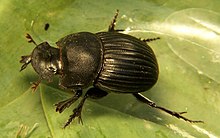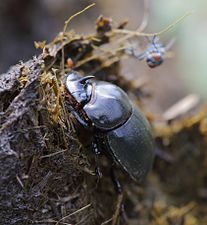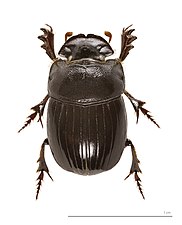
Dung beetles are beetles that feed on feces. Some species of dung beetles can bury dung 250 times their own mass in one night.

The scarab beetle subfamily Scarabaeinae consists of species collectively called true dung beetles. Most of the beetles of this subfamily feed exclusively on dung. However, some may feed on decomposing matter including carrion, decaying fruits and fungi. Dung beetles can be placed into three structural guilds based on their method of dung processing namely rollers (telecoprids), dwellers (endocoprids) and tunnelers (paracoprids). Dung removal and burial by dung beetles result in ecological benefits such as soil aeration and fertilization; improved nutrient cycling and uptake by plants, increase in Pasture quality, biological control of pest flies and intestinal parasites and secondary seed dispersal. Well-known members include the genera Scarabaeus and Sisyphus, and Phanaeus vindex.

Catharsius is a genus of dung beetles in the tribe Coprini in the scarab family.

Epirinus is a genus of dung beetles in the tribe Deltochilini of the scarab family. It comprises 29 species from southern Africa; a few species are widespread in the region, but most have limited ranges. Length ranges from 3.0 mm to 13.5 mm.

Euoniticellus is a genus of dung beetles in the subfamily Scarabaeinae of the scarab beetle family.
Dicranocara is a genus of Scarabaeidae or scarab beetles in the superfamily Scarabaeoidea. Dicranocara is endemic to the Richtersveld National Park. Three species are known, D. deschodti Frolov and Scholtz, D. tatasensis Deschodt and Scholtz and D. inexpectata Deschodt and Scholtz. Only D. tatasensis occurs south of the Orange River.

Oniticellus is a genus of dung beetles in the subfamily Scarabaeinae of the scarab beetle family.
Versicorpus is a genus of Scarabaeidae or scarab beetles in the superfamily Scarabaeoidea. Versicorpus is endemic to Namibia and is only found at the Mount Erongo. This is a monotypic genus with only one species, Versicorpus erongoensis.

Gymnopleurini is a tribe of scarab beetles, in the dung beetle subfamily (Scarabaeinae), but it may now be combined with the Scarabaeini. The side edge of each elytron has a characteristic shape that exposed the underlying pleural sclerites. Relative to other dung beetles they are of moderate size.

Coprini is a tribe of scarab beetles, in the dung beetle subfamily (Scarabaeinae). Scholtz et al. describe them as tunnellers that are shiny black, of moderate to large size and with a strongly convex shape. They also, however state that the grouping based on these characteristics has little phylogenetic validity, and the placement of several genera in this and related tribes is likely to change.

Metacatharsius is a genus of dung beetles in the tribe Coprini of the scarab family. It comprises more than 60 species from Africa; one is also found in Arabia, and Pakistan.

Deltochilini is a tribe of scarab beetles, in the dung beetle subfamily (Scarabaeinae). Members of this group vary widely in size and shape, but were thought to be derived from an ancient ball-rolling lineage. The outer edges of the front tibiae have less than four teeth. The grouping based on these characteristics has, however, been found to have little phylogenetic validity, and the placement of several genera in the tribe is likely to change.
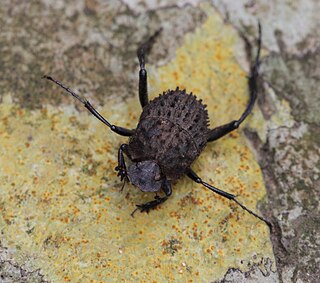
Sisyphini is a tribe of scarab beetles, in the dung beetle subfamily (Scarabaeinae), but it may now be combined with the Scarabaeini. The middle and hind legs are very long; the relatively short body is laterally compressed and has flattened sides. Relative to other dung beetles they are of small to moderate size.

Sarophorus is a genus of dung beetles in the tribe Ateuchini of the family Scarabaeidae. It comprises about ten species from Africa.

Phanaeini is a tribe of dung beetles in the family Scarabaeidae. There are about 12 genera and 200 described species in Phanaeini. They are native to the Americas with the highest species richness in the Neotropics. They are mostly coprophagous or necrophagous, but some of the least known genera appear to be myrmecophilous. They are medium-sized to large beetles, often with bright metallic colors, and often with horns on their heads.
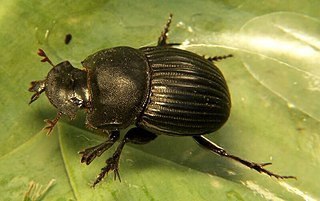
Copris fricator is a species of dung beetle in the family Scarabaeidae.
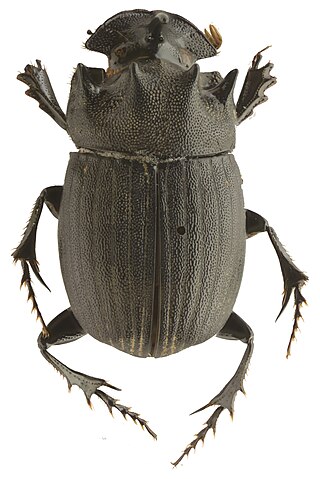
Copris caobangensis is a species of dung beetles described in 2018. The holotype was collected in Pia Oac Nature Reserve, Caobang Province, Vietnam at an altitude of 1210–1230 m in 2017.
Copris repertus, is a species of dung beetle found in India, Sri Lanka and Myanmar.
Sisyphus crispatus, is a species of dung beetle found in India, Sri Lanka and Pakistan.
